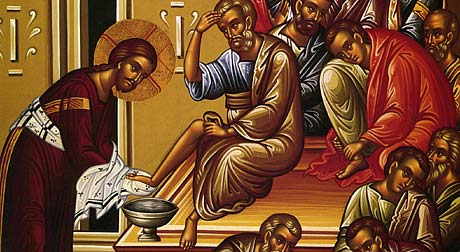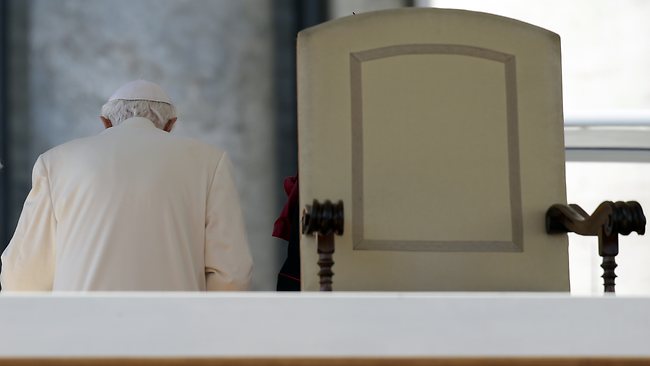Today’s gospel reading is a fitting reminder that the Christian model of leadership is not of this earth. Of course, Our Redeemer, who had also said “before Abraham was, I Am,” was of heaven. Thus Jesus tells the disciples,
“You know that the rulers of the Gentiles lord it over them, and the great ones make their authority over them felt.
But it shall not be so among you.
Rather, whoever wishes to be great among you shall be your servant; whoever wishes to be first among you shall be your slave. Just so, the Son of Man did not come to be served but to serve and to give his life as a ransom for many.”
I think Pope Benedict XVI lives this model of servant leadership, and has throughout his pontificate. Even now he is putting it into practice with his resignation, much to our surprise and even to our awe.
Today the Pope delivered his final Wednesday General Audience and his remarks are full of wisdom and hope.
This is a big moment in the life of the Church. The size of the crowds in St. Peter’s’ Square attests to this fact. In less than 24 hours, the seat of St. Peter will be vacant, you see.
What does one say to mark a moment like this? During times like these, I turn to poetry. Not my own (far from it!), but lines of verse from artisans of thoughts engraved upon the mind’s eye through the use of carefully chosen words.
In this case, the artist is T.S. Eliot, and the words are from the third stanza of the poem East Coker from his masterful work, Four Quartets. In truth, the entire poem is worth sharing, from it’s opening sentence,
In my beginning is my end.
to it’s final thought.
In my end is my beginning.
Shades of the third chapter of Ecclesiastes are alluded to in the first stanza, reminding us that there is little use in being anxious as God’s will works through events. And though all five stanza are worthy to mark this moment, the third strikes the chord most clearly for what is unfolding before our eyes.
O dark dark dark. They all go into the dark,
The vacant interstellar spaces, the vacant into the vacant,
The captains, merchant bankers, eminent men of letters,
The generous patrons of art, the statesmen and the rulers,
Distinguished civil servants, chairmen of many committees,
Industrial lords and petty contractors, all go into the dark,
And dark the Sun and Moon, and the Almanach de Gotha
And the Stock Exchange Gazette, the Directory of Directors,
And cold the sense and lost the motive of action.
And we all go with them, into the silent funeral,
Nobody’s funeral, for there is no one to bury.
I said to my soul, be still, and let the dark come upon you
Which shall be the darkness of God. As, in a theatre,
The lights are extinguished, for the scene to be changed
With a hollow rumble of wings, with a movement of darkness on darkness,
And we know that the hills and the trees, the distant panorama
And the bold imposing facade are all being rolled away—
Or as, when an underground train, in the tube, stops too long between stations
And the conversation rises and slowly fades into silence
And you see behind every face the mental emptiness deepen
Leaving only the growing terror of nothing to think about;
Or when, under ether, the mind is conscious but conscious of nothing—
I said to my soul, be still, and wait without hope
For hope would be hope for the wrong thing; wait without love
For love would be love of the wrong thing; there is yet faith
But the faith and the love and the hope are all in the waiting.
Wait without thought, for you are not ready for thought:
So the darkness shall be the light, and the stillness the dancing.
Whisper of running streams, and winter lightning.
The wild thyme unseen and the wild strawberry,
The laughter in the garden, echoed ecstasy
Not lost, but requiring, pointing to the agony
Of death and birth.You say I am repeating
Something I have said before. I shall say it again,
Shall I say it again? In order to arrive there,
To arrive where you are, to get from where you are not,
You must go by a way wherein there is no ecstasy.
In order to arrive at what you do not know
You must go by a way which is the way of ignorance.
In order to possess what you do not possess
You must go by the way of dispossession.
In order to arrive at what you are not
You must go through the way in which you are not.
And what you do not know is the only thing you know
And what you own is what you do not own
And where you are is where you are not.
And so we will wait patiently for another shepherd to guide the flock. And while we wait, we pray with the confidence of the prophetic shepherd, and poet-king of old, remembering He whose Spirit will decide the one who, after a short time, will be vouchsafed with the Keys.
“Be still, and know that I am God!
I am exalted among the nations,
I am exalted in the earth.”
The Lord of hosts is with us;
the God of Jacob is our refuge.
Amen.
Read T.S. Eliot’s East Coker in its entirety here. For better thoughts in prose on the retirement of Pope Benedict XVI, read ‘night Papa, by Thomas L. McDonald.













